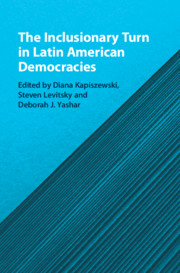Book contents
- The Inclusionary Turn in Latin American Democracies
- The Inclusionary Turn in Latin American Democracies
- Copyright page
- Contents
- Figures
- Tables
- Contributors
- Acknowledgments
- Prologue: Reflections on Two Episodes of Popular Inclusion
- 1 Inequality, Democracy, and the Inclusionary Turn in Latin America
- Part I Extending Social Policy and Participation
- Part II Inclusion and Partisan Representation
- Part III New Party–Society Linkages
- Part IV Inclusion, Populism, and Democracy
- 12 Pathways to Inclusion in Latin America
- 13 Inclusionary Turn, Rentier Populism, and Emerging Legacies
- 14 Strong Citizens, Strong Presidents
- 15 Shaping the People
- 16 The Inclusionary Turn and Its Political Limitations
- References
12 - Pathways to Inclusion in Latin America
from Part IV - Inclusion, Populism, and Democracy
Published online by Cambridge University Press: 12 January 2021
- The Inclusionary Turn in Latin American Democracies
- The Inclusionary Turn in Latin American Democracies
- Copyright page
- Contents
- Figures
- Tables
- Contributors
- Acknowledgments
- Prologue: Reflections on Two Episodes of Popular Inclusion
- 1 Inequality, Democracy, and the Inclusionary Turn in Latin America
- Part I Extending Social Policy and Participation
- Part II Inclusion and Partisan Representation
- Part III New Party–Society Linkages
- Part IV Inclusion, Populism, and Democracy
- 12 Pathways to Inclusion in Latin America
- 13 Inclusionary Turn, Rentier Populism, and Emerging Legacies
- 14 Strong Citizens, Strong Presidents
- 15 Shaping the People
- 16 The Inclusionary Turn and Its Political Limitations
- References
Summary
Historical change is often driven by demands for inclusion by previously marginalized groups. Latin America’s most recent inclusionary turn was characterized by an emphasis on constitutionalism, an explosion of popular participation, and a commitment to social policies that empowered and lifted millions of people out of poverty. Practices of citizenship were at the heart of these struggles for inclusion. Yet failure to ratchet-up citizenship rights leaves the region vulnerable to the undoing of inclusionary reforms, and thus a return to exclusion, repression, and democratic backsliding. To trace the evolution of inclusion in the region, and to better understand how cycles of inclusion and exclusion have often eroded state capacity, this chapter outlines political logics of inclusion, describes how these logics have changed over historical periods, analyzes the structural-historical conditions that shape whether inclusion threatens the interests of powerful actors, sketches alternative pathways to inclusion, and discusses inclusionary outcomes and the unfinished business of building a citizens’ democracy. It compares cases varying along two dimensions: changes in the types of inclusion over time and differences in pathways to inclusion across the region. The breadth of the comparison brings structural-historical factors back into focus, without denying the importance of political institutions.
- Type
- Chapter
- Information
- The Inclusionary Turn in Latin American Democracies , pp. 401 - 433Publisher: Cambridge University PressPrint publication year: 2021

